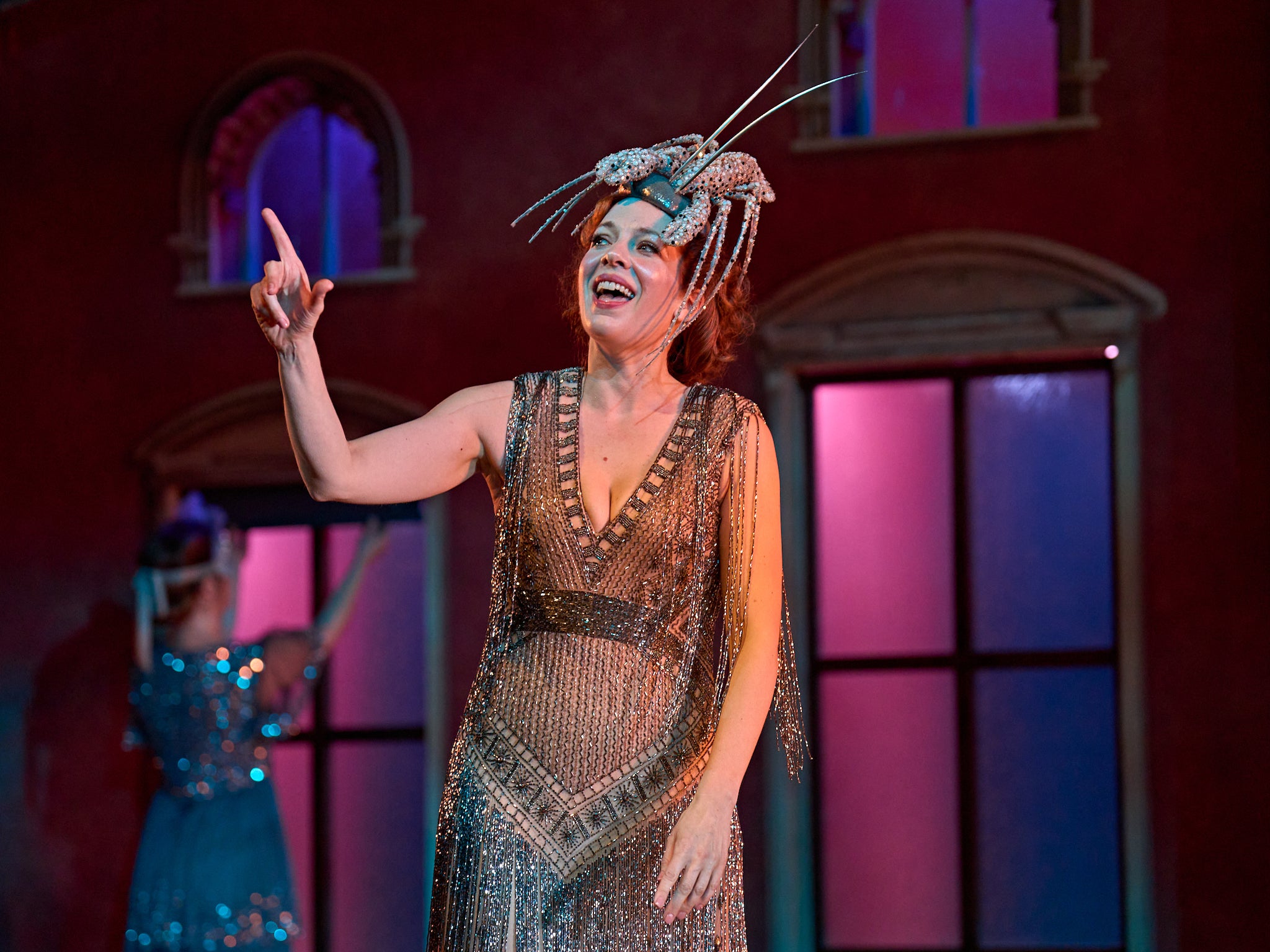Katherine Parkinson: ‘I used to think it was not a big deal being sexually fulfilled... But it’s massively important to your entire being’
The ‘IT Crowd’ and ‘Here We Go’ star is playing Beatrice in ‘Much Ado About Nothing’. She talks to Jessie Thompson about using wit as a defence, problematic Shakespeare plays and why female desire is a feminist issue


It would be fun to go for tequilas with Katherine Parkinson. It would also, at this time, be inappropriate. The star of the BBC One family sitcom Here We Go and Channel 4’s The IT Crowd is wry, ribald, and resolutely refuses to take herself too seriously, but it’s a Monday lunchtime and we’re here to talk about Shakespeare. She’s never done it before – “but can we say I have?” she suggests, “‘In the regions’?” – yet she is going straight into god-tier, playing the smart, strong-minded and, secretly, a bit sad Beatrice in Much Ado About Nothing at the National Theatre.
It’s expert, air punch-worthy casting. Parkinson’s quick wit sometimes obscures the fact that she is a very good actress. In 2019, she nabbed an Olivier nomination for her performance in Laura Wade’s Home, I’m Darling, as a woman who rejects modern feminism and turns her life into a Cath Kidston fever dream. Just before the pandemic, she was giving a beguilingly off-kilter performance as a commuter whose life unravels when she loses her shoe in EV Crowe’s Shoe Lady. But she’s also, obviously, very funny – both as an actor, and appearing as herself on shows like Taskmaster. Beatrice brings all of this together: it’s a role that’s droll, dramatic and has plenty of big speeches. She’s one of Shakespeare’s very best heroines.
A conversation with Parkinson is full of this light and shade. She can quip for Britain – asked who the next PM should be, she replies “Nadine Dorries... I’m really hoping she’s gonna run” – but there are things that really matter to her. She talks about them passionately, without flippancy – and then catches herself. Like when, seriously and thoughtfully, Parkinson tells me: “I did always want to play Beatrice and – this will sound very wanky – but part of me feels… like… I am… Beatrice.” She stops and erupts into a cackle. “Oh god. I can’t believe I just said that.”
It’s a character that resonates because “she’s somebody who uses wit as a defence. I mean, not always defensively, but sometimes as a way of compensating for some long-held sense of injustice, feelings of inadequacy” – she adds, in a hurried, self-mocking voice – “which perhaps I do.” In the past, she rejected the idea that comedy comes from a defensive place, “because I find it offensive, the suggestion that you’re only funny if you’re damaged and vulnerable. But I think in the play, it is a kind of shield [for Beatrice]. But she’s also very joyful – they say, ‘she wakes herself with laughing.’”
To borrow Parkinson’s summary of Much Ado, “it sort of feels a bit like a couple that have had a tiff and then snog at the end”. Beatrice and Benedick are entangled in a war of words, ignoring the fact they fancy each other because, it is alluded, he caused her some past hurt. The NT’s production is directed by Simon Godwin, who was behind the Jessie Buckley/Josh O’Connor Romeo & Juliet during lockdown and who made the riotous gender-flipped Twelfth Night with Tamsin Grieg. His Much Ado is set in 1930s Sicily, with a live band, a “Wes Anderson vibe” to the set and “some quite extreme costumes” for Parkinson. Her Beatrice is an actress, returning to a hotel run by her aunt and uncle. Parkinson has a whole backstory for the couple – “I should probably mention it to John [Heffernan, playing Benedick],” she says, as an aside – in which Beatrice gave up a brilliant film job to spend time with Benedick, only for him to disappear for a lowly writing gig.
Cuts have been made to the script to bring it into the 21st century – gone is the line where Beatrice describes herself as “sunburnt”. “Sunburnt used to imply ugliness, and that’s not okay,” says Parkinson. The question of whether it’s right to keep putting on certain Shakespeare plays is a fraught one; earlier this year, Juliet Stevenson suggested that The Taming of the Shrew and The Merchant of Venice “should just be buried”.

“I agree, there are problems,” Parkinson says. “I know that you can say that all great art is great art. But if you know the context, you might find that you want to go for some other great art. Not the great art that’s got problems around it.” It’s unfortunate, she notes, that dumping Merchant takes Portia – one of the best Shakespeare parts for women – out of rotation.
Parkinson might be inclined to bury some of her own previous roles too. “Mm-hmm,” she says, mouth pursed, not naming them. “I’m definitely not a particularly sanctimonious person, but I just think… TV’s really quite sophisticated now. And you’ve got to think through your message and your story.” TV, after all, can be formative. Parkinson remembers watching Only Fools and Horses with her family growing up – “you would almost learn your humour by watching what your parents laughed at”. Her two daughters are now old enough to watch certain shows with their parents; they loved her own show, Here We Go. The sitcom, about a family navigating daily chaos, was one of the best comedies of the year – but it was something of a sleeper hit. Perhaps, Parkinson wonders, because “it wasn’t packaged as radical or edgy” – but she doesn’t think the humour in it was “tame”. “I don’t like tame humour. Why would we bother?”
She remains best known for playing Jen in The IT Crowd, for which she won a Bafta in 2014. Nearly a decade since it ended, it still enjoys cult status. “The surprise to me with that show is that in lockdown loads of ‘young people’ were watching it. And ‘young people’ coming up to me and still recognising me from it… which is good.” Some of the show seems “quite dated” now, Parkinson thinks. In 2020 an episode from the third series was removed after being condemned as transphobic. “And I think that’s right”. (In the episode, Matt Berry’s character becomes angry after discovering the woman he has been dating is trans, and the pair engage in a physical fight.)
The idea of leading with your desire was out of the question. That meant you were a slag, let’s be clear.
It strikes me, in hindsight, as a shame that an actress as good and funny as Parkinson made her name as the sidekick to two dudes – Richard Ayoade’s Maurice and Chris O’Dowd’s Ray. “I think all I would say to that is, I was very good friends with Chris before we started. And how lovely that he had a role that was written by somebody who was also his age-ish, and also Irish. It was very tailor-made for Chris, and I always did feel… I’d go to rehearsals in my sort of strange vintage outfits with my hair all curly, and Graham [Linehan, writer] would be like, ‘Okay, I want her to look like Ally McBeal.’ And I’d suddenly have my hair straightened and be put in a pencil skirt. Not in a way that was knowing on Graham or anyone’s part, but he was objectifying me because he’s not a woman. And eventually, over time, I got a handle, he sort of picked up on my personal quirks.”
It’s not a writer’s fault, she adds – people write subjectively from their own experience. The solution: more writers with varied perspectives. Wade’s script for Home, I’m Darling comes along, for example, and “the glove fits”. But when Parkinson started her career, there wasn’t the same energy behind female-led stories, the kind that has enabled Fleabag, I Hate Suzie and I May Destroy You to come to our screens. Does she ever feel a bit gutted about that? “Yeah!” she says, slightly pained. “I think you are defined by your generation, much more than you think.” This year’s Good Luck to You Leo Grande, starring Emma Thompson as a widow in search of her own pleasure and written by “great friend” and creative collaborator Katy Brand, “resonated so much”.
“When I grew up it was all about consent. You would consent if somebody was a nice guy. The idea of leading with your desire was out of the question. That meant you were a slag, let’s be clear. And I know not everyone in my generation grew up with that feeling. But that was very much how I grew up.” Parkinson was born in suburban Isleworth and went to Oxford in the Nineties to study classics; she was in the women’s college St Hilda’s (it began to admit men for the first time in 2008). In her entrance interview, a tutor told her that, given the choice between two good candidates he’d choose the pretty one. (“Because I was only 17, I was trying to work out which category he thought I was in,” she previously said.)

That same sense of not asking for too much fed into her creative self-image. “I sort of thought, ‘Oh, I’m just not a writer. Write!? I’m an actress!’ Now I realise that I was writing when I was younger. I was writing with Katy.” The pair had a pilot on Radio Four that wasn’t recommissioned. “Now, 20 years later, we’ve got a series [podcast Women Like Us]. It’s much the same thing. And I do sometimes look back and think our creative instincts were slightly cut off in a way they wouldn’t have been”. Now, writers like Phoebe Waller-Bridge and Michaela Coel are “leading from the front. And I do think there’s a story to be told for the women that are a generation above. Because those heroines, they might be f***ed up, but they’re not sexually repressed.” Millennial female protagonists get to have two important things: agency. And orgasms. “They’re hot messes. And I think there’s a privilege to being a hot mess that was not open to [us]”.
Female desire is “a feminist issue”, she insists. “I used to think it was not a big deal being sexually fulfilled, that’s it’s just this little add-on. But it’s massively important to your entire being. It’s the confidence those girls have. They might go through the dramas they go through in those TV shows. But they know themselves in a profound and basic, deep way. And in a way that I for one didn’t even believe was a thing.”
Perhaps it’s possible to correct all of this. Parkinson wrote her first play, Sitting, in 2018; it was broadcast on BBC Four last year. She says she’s written another one – “I don’t say it in the rehearsal room, because you sound like a cock” – and has some TV projects “percolating”. These, she says, may have something to do with what we’ve been talking about – the untold stories of women, that “maybe it’s not too late to tell”. After that… maybe we can have some tequilas.
Much Ado About Nothing is at the National Theatre until 10 September; it will be broadcast to UK cinemas as an NT Live on 8 September
Join our commenting forum
Join thought-provoking conversations, follow other Independent readers and see their replies
Comments


Bookmark popover
Removed from bookmarks